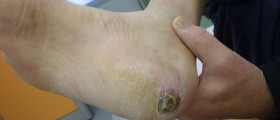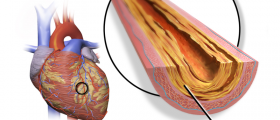Bad blood circulation may cause serious health problems. This is why it deserves attention and it needs to be treated on time.
The blood circulatory system feeds and maintains all of the cells in the human body. Blood circulation enables oxygen and nutrients to reach the cells. At the same time, it takes carbon dioxide, created by respiration, away from the cells. If the blood circulatory system is not able to work properly, many problems start to appear.
Common Symptoms of Bad Circulation
The problem of bad circulation in the hands and feet is a very common problem for the middle-aged population. At the same time, this problem is often ignored. Medical advice should be asked for in such circumstances before the problem becomes drastic. Symptoms of chronically poor circulation include cold hands and feet, or constant coldness in any part of the body, and chronic cramping of hands and legs that usually passes after some time or after rest.

Poor circulation can cause persistent weakness or numbness in a part of the body. This usually happens after sitting or standing for a longer period. Sores on hands and feet due to poor circulation may require a doctor\'s appointment. Poor blood circulation can cause cracking and peeling of nails and hair loss, due to the lack of nutrients and minerals.
Poor blood circulation may also cause dizziness and heart disease. Varicose veins and pale, red, or even blue skin are other obvious signs of circulation problems. These are the warning signs that should not be ignored.
Causes and Risk Factors
Atherosclerosis is one of the main causes of poor circulation, in which plaque deposits on the artery walls and clogs the arteries. This may be the result of a high-cholesterol diet. Consequently, the amount of blood traveling through the arteries is diminished. Another possible reason for poor circulation could be diabetes or even a sedentary lifestyle in which little physical activity exists. Obesity, smoking, and similar bad habits can often contribute to the problem of bad circulation as well.
Prevention Methods
Trying to adopt a somewhat different lifestyle on time can significantly decrease the risk of strokes or heart attacks. Before getting to the point at which heart surgery is needed, it is recommended to adopt some simple lifestyle changes. By doing so, serious health problems may be completely avoided.
People suffering from diabetes should monitor their blood sugar to avoid further problems related to poor circulation.
Sports or at least daily exercises are recommended, especially for people who have to sit for long periods because of their jobs or other reasons.
They should also try to take breaks to exercise and improve their blood flow. Foods heavy in cholesterol should be avoided, as should smoking.
Warm baths, massages, and physiotherapy may also help to get the blood moving.
- People who are older than age 40, are overweight, have diabetes and don’t get much exercise are more likely to have poor circulation.
- You may feel pain, numbness, tingling or cold in the parts of your body that have bad circulation. Often, poor circulation symptoms affect your legs, hands, fingers, feet and toes.
- Poor circulation can cause a number of symptoms, including muscles that hurt or feel weak when you walk, a “pins and needles” sensation on your skin, pale or blue skin color, cold fingers or toes, numbness, chest pain, swelling, veins that bulge.
- Any surgery has a risk of bleeding. Medicines that keep your body from creating large blood clots also have a risk of bleeding. Your provider will work with you to get your dosage right so you don’t bleed excessively when you get hurt.
- If you don’t do something about your bad circulation, it won’t get better on its own. In fact, it can get worse. But you can manage and improve your poor circulation with lifestyle changes, medication and surgery, if necessary.
- www.nhs.uk/conditions/raynauds/
- www.healthline.com/health/poor-circulation-symptoms-causes
- Photo courtesy of Thomas Galvin by Wikimedia Commons: commons.wikimedia.org/wiki/File:Raynaud%27s_Phenomenon_%28front%29.jpg



_f_280x120.jpg)













Your thoughts on this
Loading...